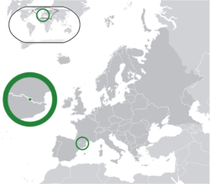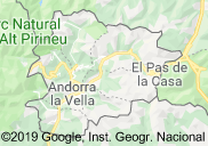Role in WW2
|
Technically, Andorra was still at war with Germany since World War I (and would remain at war long after World War II, declaring peace in 1958) due to being left out of the Versailles Peace Conference. Nonetheless, Andorra remained politically neutral throughout the war but was used as a smuggling route by Axis Vichy French and Axis-aligned Spanish personnel.
In the modern era, the army has consisted of a very small body of volunteers willing to undertake ceremonial duties. Uniforms and weaponry were handed down from generation to generation within families and communities. The army's role in internal security was largely taken over by the formation of the Police Corps of Andorra in 1931. Brief civil disorder associated with the elections of 1933 led to assistance being sought from the French National Gendarmerie, with a detachment resident in Andorra for two months under the command of René-Jules Baulard. The Andorran Police was reformed in the following year, with eleven soldiers appointed to supervisory roles. The force consisted of six Corporals, one for each parish, plus four junior staff officers to co-ordinate action, and a commander with the rank of major. It was the responsibility of the six corporals, each in his own parish, to be able to raise a fighting force from among the able-bodied men of the parish. In 1933, France occupied Andorra as a result of social unrest before elections. On July 12, 1934, an adventurer named Boris Skossyreff issued a proclamation in Urgel, declaring himself Boris I, sovereign prince of Andorra, simultaneously declaring war on the Bishop of Urgell. He was arrested by Spanish authorities on July 20 and ultimately expelled from Spain. From 1936 to 1940, a French detachment was garrisoned in Andorra to prevent influences of the Spanish Civil War and Francoist Spain. During World War II, Andorra remained neutral and was an important smuggling route from Spain into France. The French Resistance used Andorra as part of their route to get downed airmen out of France. In 1943, Andorra carried out its first execution since the 19th century: Antoni Arenis was executed for double fratricide by firing squad because a trained executioner was unavailable to operate the legal method, by garrote. |



